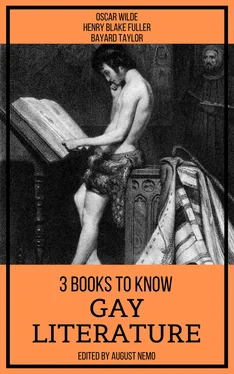“Certainly, Harry. Just touch the bell, and when Parker comes I will tell him what you want. I have got to work up this background, so I will join you later on. Don’t keep Dorian too long. I have never been in better form for painting than I am to-day. This is going to be my masterpiece. It is my masterpiece as it stands.”
Lord Henry went out to the garden, and found Dorian Gray burying his face in the great cool lilac-blossoms, feverishly drinking in their perfume as if it had been wine. He came close to him, and put his hand upon his shoulder. “You are quite right to do that,” he murmured. “Nothing can cure the soul but the senses, just as nothing can cure the senses but the soul.”
The lad started and drew back. He was bareheaded, and the leaves had tossed his rebellious curls and tangled all their gilded threads. There was a look of fear in his eyes, such as people have when they are suddenly awakened. His finely-chiselled nostrils quivered, and some hidden nerve shook the scarlet of his lips and left them trembling.
“Yes,” continued Lord Henry, “that is one of the great secrets of life — to cure the soul by means of the senses, and the senses by means of the soul. You are a wonderful creation. You know more than you think you know, just as you know less than you want to know.”
Dorian Gray frowned and turned his head away. He could not help liking the tall, graceful young man who was standing by him. His romantic olive-coloured face and worn expression interested him. There was something in his low, languid voice that was absolutely fascinating. His cool, white, flower-like hands, even, had a curious charm. They moved, as he spoke, like music, and seemed to have a language of their own. But he felt afraid of him, and ashamed of being afraid. Why had it been left for a stranger to reveal him to himself? He had known Basil Hallward for months, but the friendship between them had never altered him. Suddenly there had come someone across his life who seemed to have disclosed to him life’s mystery. And, yet, what was there to be afraid of? He was not a schoolboy or a girl. It was absurd to be frightened.
“Let us go and sit in the shade,” said Lord Henry. “Parker has brought out the drinks, and if you stay any longer in this glare you will be quite spoiled, and Basil will never paint you again. You really must not allow yourself to become sunburnt. It would be unbecoming.”
“What can it matter?” cried Dorian Gray, laughing, as he sat down on the seat at the end of the garden.
“It should matter everything to you, Mr. Gray.”
“Why?”
“Because you have the most marvellous youth, and youth is the one thing worth having.”
“I don’t feel that, Lord Henry.”
“No, you don’t feel it now. Some day, when you are old and wrinkled and ugly, when thought has seared your forehead with its lines, and passion branded your lips with its hideous fires, you will feel it, you will feel it terribly. Now, wherever you go, you charm the world. Will it always be so? . . . You have a wonderfully beautiful face, Mr. Gray. Don’t frown. You have. And Beauty is a form of Genius — is higher, indeed, than Genius, as it needs no explanation. It is of the great facts of the world, like sunlight, or spring-time, or the reflection in dark waters of that silver shell we call the moon. It cannot be questioned. It has its divine right of sovereignty. It makes princes of those who have it. You smile? Ah! when you have lost it you won’t smile. . . . People say sometimes that Beauty is only superficial. That may be so. But at least it is not so superficial as Thought is. To me, Beauty is the wonder of wonders. It is only shallow people who do not judge by appearances. The true mystery of the world is the visible, not the invisible. . . . Yes, Mr. Gray, the gods have been good to you. But what the gods give they quickly take away. You have only a few years in which to live really, perfectly, and fully. When your youth goes, your beauty will go with it, and then you will suddenly discover that there are no triumphs left for you, or have to content yourself with those mean triumphs that the memory of your past will make more bitter than defeats. Every month as it wanes brings you nearer to something dreadful. Time is jealous of you, and wars against your lilies and your roses. You will become sallow, and hollow-cheeked, and dull-eyed. You will suffer horribly. . . . Ah! realise your youth while you have it. Don’t squander the gold of your days, listening to the tedious, trying to improve the hopeless failure, or giving away your life to the ignorant, the common, and the vulgar. These are the sickly aims, the false ideals, of our age. Live! Live the wonderful life that is in you! Let nothing be lost upon you. Be always searching for new sensations. Be afraid of nothing. . . . A new Hedonism — that is what our century wants. You might be its visible symbol. With your personality there is nothing you could not do. The world belongs to you for a season. . . . The moment I met you I saw that you were quite unconscious of what you really are, of what you really might be. There was so much in you that charmed me that I felt I must tell you something about yourself. I thought how tragic it would be if you were wasted. For there is such a little time that your youth will last — such a little time. The common hill-flowers wither, but they blossom again. The laburnum will be as yellow next June as it is now. In a month there will be purple stars on the clematis, and year after year the green night of its leaves will hold its purple stars. But we never get back our youth. The pulse of joy that beats in us at twenty, becomes sluggish. Our limbs fail, our senses rot. We degenerate into hideous puppets, haunted by the memory of the passions of which we were too much afraid, and the exquisite temptations that we had not the courage to yield to. Youth! Youth! There is absolutely nothing in the world but youth!”
Dorian Gray listened, open-eyed and wondering. The spray of lilac fell from his hand upon the gravel. A furry bee came and buzzed round it for a moment. Then it began to scramble all over the oval stellated globe of the tiny blossoms. He watched it with that strange interest in trivial things that we try to develop when things of high import make us afraid, or when we are stirred by some new emotion for which we cannot find expression, or when some thought that terrifies us lays sudden siege to the brain and calls on us to yield. After a time the bee flew away. He saw it creeping into the stained trumpet of a Tyrian convolvulus. The flower seemed to quiver, and then swayed gently to and fro.
Suddenly the painter appeared at the door of the studio, and made staccato signs for them to come in. They turned to each other, and smiled.
“I am waiting,” he cried. “Do come in. The light is quite perfect, and you can bring your drinks.”
They rose up, and sauntered down the walk together. Two green-and-white butterflies fluttered past them, and in the pear-tree at the corner of the garden a thrush began to sing.
“You are glad you have met me, Mr. Gray,” said Lord Henry, looking at him.
“Yes, I am glad now. I wonder shall I always be glad?”
“Always! That is a dreadful word. It makes me shudder when I hear it. Women are so fond of using it. They spoil every romance by trying to make it last for ever. It is a meaningless word, too. The only difference between a caprice and a life-long passion is that the caprice lasts a little longer.”
As they entered the studio, Dorian Gray put his hand upon Lord Henry’s arm. “In that case, let our friendship be a caprice,” he murmured, flushing at his own boldness, then stepped up on the platform and resumed his pose.
Lord Henry flung himself into a large wicker arm-chair and watched him. The sweep and dash of the brush on the canvas made the only sound that broke the stillness, except when, now and then, Hallward stepped back to look at his work from a distance. In the slanting beams that streamed through the open doorway the dust danced and was golden. The heavy scent of the roses seemed to brood over everything.
Читать дальше












